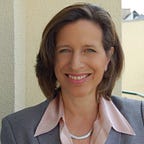Our world is boiling. But we can still turn down the heat
We now know for sure: Our world is boiling. July was the hottest month ever recorded on Earth. This record-shattering heat tells us terrifying climate change is in full swing. And scientists’ models suggest this is only the beginning.
Record breaking heat, wildfires, flooding and extreme weather are already devastating lives across the planet, this month wrecking communities in vast parts of North America, Asia, Africa and Europe, conditions scientists say are likely becoming an alarming new normal.
I am reading studies that alarming headlines like these make lots of people turn off the news in despair. It is just too much.
Yet we need may more people on board to stave off catastrophe — we can’t afford to lose the public to defeatism.
This is the communications dilemma we face. How to galvanize people into action without overwhelming them with fear. We need people to worry, but we also need them to feel hope and ultimately to engage.
The problem is that too much alarm causes people to switch off. Aggressive lobbying by the fossil fuel industry has exploited this and succeeded for too long in delaying action, but now we are seeing a kind of collective awakening to the reality of the climate emergency.
We know with dramatic, immediate action, we can still limit global temperature rise to 1.5 degrees Celsius and avoid the worst outcomes. It is also clear we need more effective communications, aimed at vast audiences who have disengaged or who have just woken up to climate shock.
Climate communications experts advise not to bother with the climate ‘dismissives’ — they have been fed a steady diet of climate distortion or denial and would not be convinced by pointing to consensus climate science. They may seem to dominate online discourse, but they are a small minority and are unlikely to change their views.
Instead, we must concentrate our efforts on people in the middle, who are disengaged or simply overwhelmed. We must also speak to those voices saying it’s too late, that we are already doomed. And if we can connect to people by addressing what they care about — their local farm, their skiing hobby, their water source or their child’s health — we can make our warnings about the climate relatable.
Climate scientist and communicator, Katharine Hayhoe writes in her remarkable book, Saving Us, that individual action can undo paralysis and even become contagious. And this can ignite policy change too.
Many people feel their voice or action would hardly make a difference. That is wrong. Change on any level can help shift the dial. Early adopters of electric cars or solar panels, for example, can influence whole neighborhoods. The UN has a campaign called ACTNOW that offers tips for individual action that can bring down your own emissions.
Or course, the most urgent and impactful need is policy change. The majority of the planet wants ambitious action. The UN is urging leaders in governments, industry, and the private sector to rapidly accelerate climate action. Engaged citizens can pressure leaders to do just that. “No matter what our place is in society,” Ms. Hayhoe points out, “important problems don’t get fixed until enough ordinary people mobilize to take action.”
One important pathway is litigation. Across the world, growing numbers of citizens are coming together to take companies and governments to court for failing to protect them from catastrophe. These excellent examples of people power are now a key tool in delivering climate justice.
The tens of millions on the front lines of the crisis cannot afford inaction. They are already struggling to survive. We know what to do, and we know how to do it. We must end our reliance on fossil fuels — it’s a question of doing it, altogether, right now.
Here at the UN, we are also shifting our Verified campaign to turn the tide on denialism, doomism and the narrative of delay. We aim to mobilize communities around the transition to renewable energy and serve as an antidote to the proliferation of climate disinformation designed to keep people hooked on fossil fuels.
So, let’s talk about the climate emergency while staying clear-sighted about the opportunities we still have for change. By offering hope and ways to get involved, we can win back those giving into despair.
(thank you to Josie Le Blond for her collaboration on this piece)
